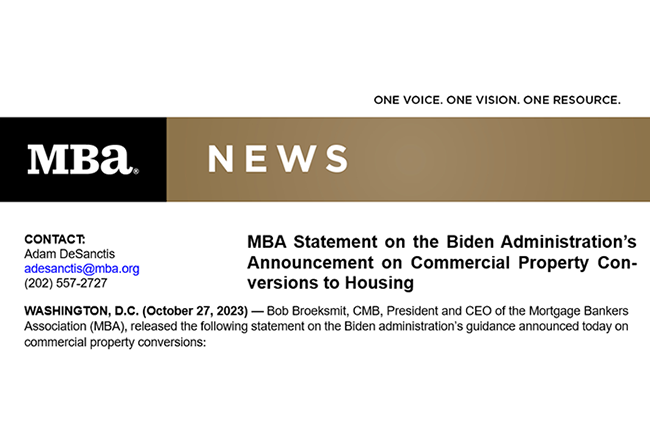
HUD, Biden Administration Encourage More Commercial-to-Residential Conversions

On Friday, HUD and the Biden Administration announced two updates to increase housing supply and improve housing affordability, including research on commercial-to-residential conversions. Mortgage Bankers Association President and CEO Robert Broeksmit, CMB, weighed in on the announcement.
The White House released a guidebook to help communities and housing providers identify federal resources to finance the conversion of commercial properties to residential uses and mixed-use development. The White House Fact sheet is available here.
Robert Broeksmit, CMB, President and CEO of the Mortgage Bankers Association, released a statement on the White House announcement:
MBA shares the Biden administration’s commitment to increasing housing supply and appreciates its willingness to engage with us and the industry on ways to incentivize lenders and borrowers to rehab, repurpose, and convert more obsolete commercial properties into affordable rental housing and other usable spaces.
Housing providers are grappling with higher interest rates and rising labor and construction costs at a time when our nation’s housing supply remains inadequate. The initiatives announced today should help facilitate more commercial-to-residential projects. We encourage state and local governments to ensure zoning laws, tax credits, and subsidies are aligned to take full advantage of these programs.
We will work with the Administration, members of the House and Senate that have crafted related legislation, and other engaged stakeholders to fashion cost-effective ways for multifamily borrowers, developers, and lenders to increase the nation’s rental housing stock.
HUD also released an updated notice on how its Community Development Block Grant funding, $10 billion of which has been allocated during this administration, can be used to boost housing supply, including acquisition, rehabilitation and commercial-to-residential conversions. This notice is the latest update on how to use CDBG resources to support the development of affordable housing. States and localities can also access up to five times their annual CDBG allocation in low-cost loan guarantees to fund projects such as the conversion of properties to housing or mixed-use development.
“Addressing the affordable housing crisis requires an all-of-the-above approach,” said Secretary Marcia Fudge. “The White House guidebook on commercial-to-residential conversions and the updated CDBG notice are just a few of the steps that HUD is taking to help our state and local partners to boost supply.”
In addition, HUD released an issue of Evidence Matters focused on office-to-residential conversions, which provides a research overview of the issues motivating the surge in interest in conversions and highlights local examples of conversion projects. HUD is providing additional research funding to develop case studies that can serve as road maps for localities interested in pursuing conversion projects. The Notice of Funding Opportunity recently closed, and awards will be made soon.
“With a shortage of millions of homes nationwide, we need to utilize every resource at our disposal to increase housing supply,” Deputy Secretary Adrianne Todman said.
The CDBG notice published Friday provides updated and expanded guidance on a wide range of housing-related activities that may be funded through the CDBG program, including acquisition, adaptive reuse, rehabilitation, reconstruction and housing counseling.
The notice also clarified that manufactured housing units that are part of the community’s permanent housing stock are eligible for acquisition or direct homeownership assistance through the CDBG program. Additionally, the CDBG notice highlighted the importance of planning in protecting and preserving housing and community resilience and provides guidance on how CDBGs can support energy and climate-related rehabilitation and tornado safe homes and public facilities.
